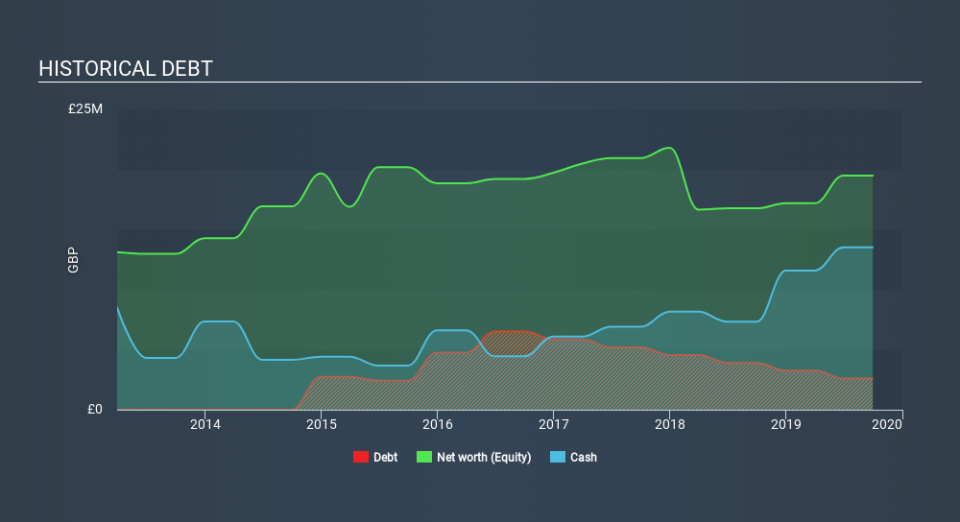These 4 Measures Indicate That Eckoh (LON:ECK) Is Using Debt Safely

The external fund manager backed by Berkshire Hathaway's Charlie Munger, Li Lu, makes no bones about it when he says 'The biggest investment risk is not the volatility of prices, but whether you will suffer a permanent loss of capital. So it might be obvious that you need to consider debt, when you think about how risky any given stock is, because too much debt can sink a company. As with many other companies Eckoh plc (LON:ECK) makes use of debt. But is this debt a concern to shareholders?
When Is Debt A Problem?
Debt is a tool to help businesses grow, but if a business is incapable of paying off its lenders, then it exists at their mercy. In the worst case scenario, a company can go bankrupt if it cannot pay its creditors. However, a more frequent (but still costly) occurrence is where a company must issue shares at bargain-basement prices, permanently diluting shareholders, just to shore up its balance sheet. Having said that, the most common situation is where a company manages its debt reasonably well - and to its own advantage. The first thing to do when considering how much debt a business uses is to look at its cash and debt together.
See our latest analysis for Eckoh
What Is Eckoh's Net Debt?
You can click the graphic below for the historical numbers, but it shows that Eckoh had UK£2.60m of debt in September 2019, down from UK£3.90m, one year before. However, its balance sheet shows it holds UK£13.5m in cash, so it actually has UK£10.9m net cash.
How Strong Is Eckoh's Balance Sheet?
We can see from the most recent balance sheet that Eckoh had liabilities of UK£22.2m falling due within a year, and liabilities of UK£2.07m due beyond that. Offsetting these obligations, it had cash of UK£13.5m as well as receivables valued at UK£13.9m due within 12 months. So it actually has UK£3.18m more liquid assets than total liabilities.
This surplus suggests that Eckoh has a conservative balance sheet, and could probably eliminate its debt without much difficulty. Simply put, the fact that Eckoh has more cash than debt is arguably a good indication that it can manage its debt safely.
Better yet, Eckoh grew its EBIT by 401% last year, which is an impressive improvement. That boost will make it even easier to pay down debt going forward. There's no doubt that we learn most about debt from the balance sheet. But it is future earnings, more than anything, that will determine Eckoh's ability to maintain a healthy balance sheet going forward. So if you want to see what the professionals think, you might find this free report on analyst profit forecasts to be interesting.
Finally, a company can only pay off debt with cold hard cash, not accounting profits. Eckoh may have net cash on the balance sheet, but it is still interesting to look at how well the business converts its earnings before interest and tax (EBIT) to free cash flow, because that will influence both its need for, and its capacity to manage debt. Over the last three years, Eckoh actually produced more free cash flow than EBIT. That sort of strong cash generation warms our hearts like a puppy in a bumblebee suit.
Summing up
While we empathize with investors who find debt concerning, you should keep in mind that Eckoh has net cash of UK£10.9m, as well as more liquid assets than liabilities. The cherry on top was that in converted 281% of that EBIT to free cash flow, bringing in UK£9.2m. So we don't think Eckoh's use of debt is risky. The balance sheet is clearly the area to focus on when you are analysing debt. However, not all investment risk resides within the balance sheet - far from it. Consider for instance, the ever-present spectre of investment risk. We've identified 1 warning sign with Eckoh , and understanding them should be part of your investment process.
At the end of the day, it's often better to focus on companies that are free from net debt. You can access our special list of such companies (all with a track record of profit growth). It's free.
If you spot an error that warrants correction, please contact the editor at editorial-team@simplywallst.com. This article by Simply Wall St is general in nature. It does not constitute a recommendation to buy or sell any stock, and does not take account of your objectives, or your financial situation. Simply Wall St has no position in the stocks mentioned.
We aim to bring you long-term focused research analysis driven by fundamental data. Note that our analysis may not factor in the latest price-sensitive company announcements or qualitative material. Thank you for reading.

